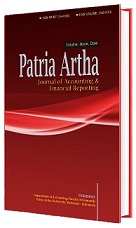Analisis Manajemen Piutang dan Implikasinya terhadap Rentabilitas Perusahaan (Kasus Perusahaan Otomotif dan Komponen di Bursa Efek Indonesia)
Abstract
This study aims to know and analyze the effect of receivable management as measured by receivable turnover and average age of receivables against profitability as measured by net profit margin (NPM).
In this study used multiple regression analysis method. The type of data is qualitatively sourced from the Indonesian Capital Market Directory (ICMD).
The results of this study indicate that: 1) the receivable management variable measured by receivable turnover does not affect the profitability measured by net profit margin (NPM), this means that the receivable turnover does not play directly in an effort to increase the profitability of the company Automotive and Components Listed on the Indonesia Stock Exchange, but the direction of influence is marked positive indicates that high receivable turnover tends to increase earnings, and 2) management variable receivable as measured by the average age of receivables does not affect the profitability as measured by net profit margin (NPM). This means that the average age of accounts receivable does not play a direct role in an effort to increase the profitability of Automotive and Component companies listed on the Indonesia Stock Exchange, but the direction of influence is marked positive indicates that the average age of high receivables tends to increase profitability.
Keywords
Full Text:
PDFDOI: https://doi.org/10.33857/jafr.v1i1.21
Refbacks
- There are currently no refbacks.
Editorial Office: Department of Accounting, Faculty of Economic, Patria Artha University. Jln. Tun Abdul Razak (Hertasning Baru), Poros Makassar–Gowa, South Sulawesi, Indonesia. | Tel./Fax : +62411-8225111 / +62411-8225112 | Email : jafre@patria-artha.ac.id













 `
`